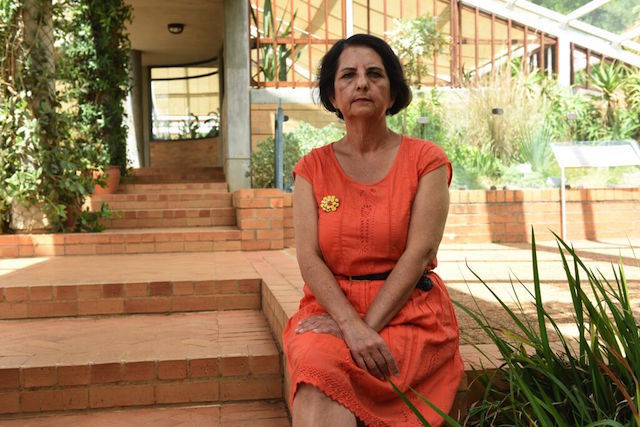Farieda Kahn: environmental advice to the poor
22 December 2015 | Story Natalie Simon. Photo Michael Hammond.
In developing countries such as South Africa, access to environmental advice and scientific expertise tends to be a luxury of the rich. The irony of this is that those groups most dependent on, and at risk from, their immediate environments are often the most disadvantaged in a society. Under the leadership of Dr Farieda Khan, the Environmental Advisory Unit (EAU), in the Department of Environmental and Geographical Science, provided environmental advice to poor communities, and acted as a conduit for other service organisations to assist poor and marginalised groups, free of charge.
The EAU worked closely with a number of non-governmental organisations (NGOs) such Abalimi Bezekhaya, an organisation which trains deprived communities to produce food gardens, and the Surplus People Project, to provide information and practical advice to communities.
One important project was an investigation into the environmental hazards of subsistence waste picking at landfill sites. The project began with a focus on the community of Frankdale, a farmstead located in the Cape Winelands region, where a number of community members rely on waste picking for survival. At the request of the Surplus People Project, the EAU advised on practical strategies to assist communities and protect them against infection. This included the provision of gloves, health and safety advice provided at meetings and in pamphlets and negotiation with landfill management on behalf of the community.
The work in Frankdale proved a catalyst for a larger research project on waste picking for survival in South Africa. “Receiving the award was a much-appreciated recognition of the projects and research carried out by the EAU,” says Khan. While the unit continued to function only for another two years after the award, she says the winning of the award acted as a spur for her to continue on the course of conducting socially responsible research.
Khan went on to complete her PhD in the Department of Environmental and Geographical Sciences, before working as a social impact assessment consultant and then as an environmental researcher in Parliament for a period. Khan now works as an independent researcher and environmental historian, still focused on the plight of the poor in South Africa.
“By 2006, I could again make time for my personal research interests and began to conduct research from the perspective of the poor and vulnerable sectors of society,” she says. These research areas include women and the environment in South Africa, the history of the Cape Flats Mountain Club and the history of tennis among black communities in Cape Town. “These projects are not only personally fulfilling but also enable me to make a contribution to unearthing the hidden history of the poor and vulnerable sectors of the community. In this way I also hope to contribute to a broader understanding of the challenges facing the sporting and environmental sectors today.”
The EAU worked closely with a number of non-governmental organisations (NGOs) such Abalimi Bezekhaya, an organisation which trains deprived communities to produce food gardens, and the Surplus People Project, to provide information and practical advice to communities.
One important project was an investigation into the environmental hazards of subsistence waste picking at landfill sites. The project began with a focus on the community of Frankdale, a farmstead located in the Cape Winelands region, where a number of community members rely on waste picking for survival. At the request of the Surplus People Project, the EAU advised on practical strategies to assist communities and protect them against infection. This included the provision of gloves, health and safety advice provided at meetings and in pamphlets and negotiation with landfill management on behalf of the community.
The work in Frankdale proved a catalyst for a larger research project on waste picking for survival in South Africa. “Receiving the award was a much-appreciated recognition of the projects and research carried out by the EAU,” says Khan. While the unit continued to function only for another two years after the award, she says the winning of the award acted as a spur for her to continue on the course of conducting socially responsible research.
Khan went on to complete her PhD in the Department of Environmental and Geographical Sciences, before working as a social impact assessment consultant and then as an environmental researcher in Parliament for a period. Khan now works as an independent researcher and environmental historian, still focused on the plight of the poor in South Africa.
“By 2006, I could again make time for my personal research interests and began to conduct research from the perspective of the poor and vulnerable sectors of society,” she says. These research areas include women and the environment in South Africa, the history of the Cape Flats Mountain Club and the history of tennis among black communities in Cape Town. “These projects are not only personally fulfilling but also enable me to make a contribution to unearthing the hidden history of the poor and vulnerable sectors of the community. In this way I also hope to contribute to a broader understanding of the challenges facing the sporting and environmental sectors today.”
 This work is licensed under a Creative Commons Attribution-NoDerivatives 4.0 International License.
This work is licensed under a Creative Commons Attribution-NoDerivatives 4.0 International License.
Please view the republishing articles page for more information.









